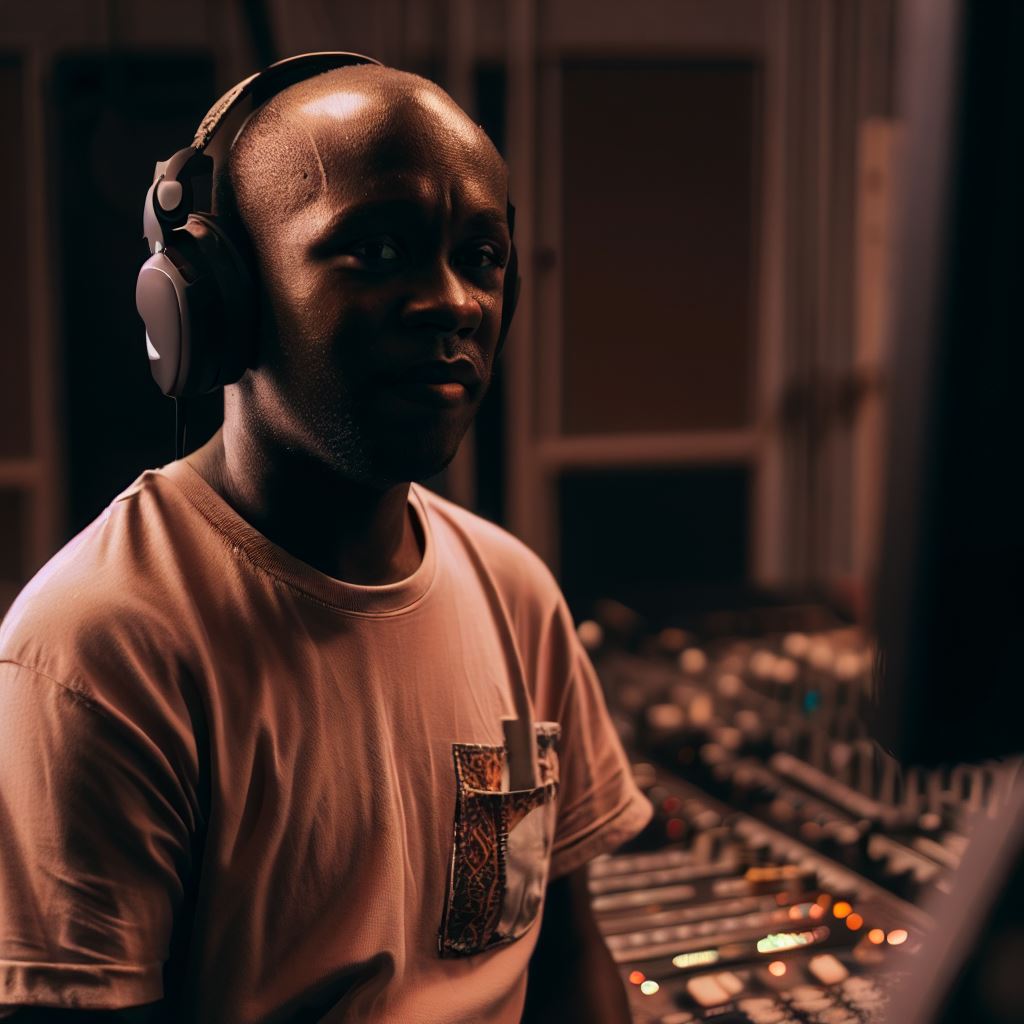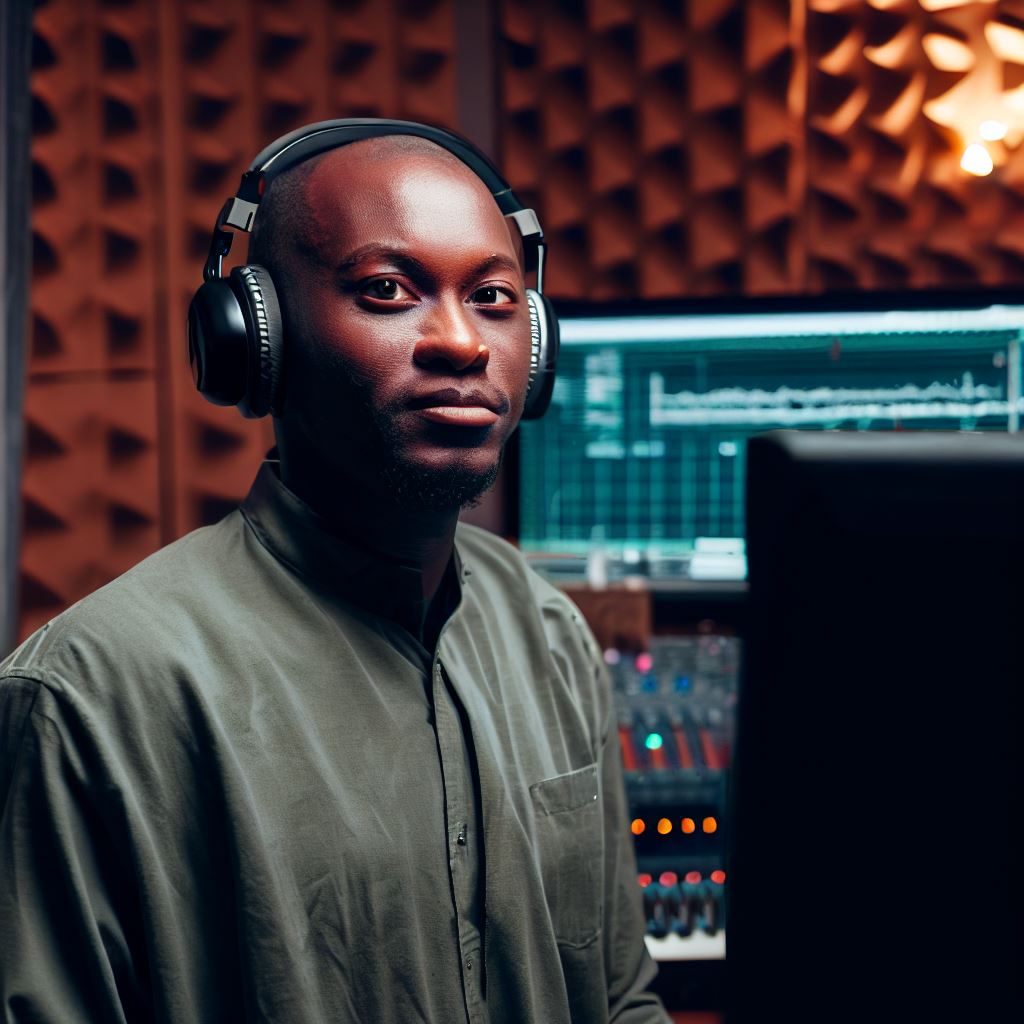Introduction
Sound engineers play a vital role in the Nigerian music industry, ensuring a high-quality and balanced sound experience for listeners.
In this blog post, we will explore a day in the life of a Nigerian sound engineer, shedding light on their importance in the music scene.
Sound engineers shape the overall sound of a song, making it captivating and professional.
This blog aims to provide an intimate glimpse into the challenges, skills, and behind-the-scenes work of these unsung heroes.
By understanding the intricacies of their role, readers will gain a deeper appreciation for the magic that happens in the recording studio.
Through this post, we hope to showcase the artistry and dedication required to create music that captivates audiences.
From collaborating with artists to setting up equipment, a sound engineer’s day is packed with creativity and technical tasks.
Join us on this journey as we unravel the daily adventures of a Nigerian sound engineer and gain insights into their indispensable contribution to the music industry.
Education and Training
In order to become a sound engineer in Nigeria, individuals must undergo specific education and training.
This field requires a combination of technical skills and theoretical knowledge.
A. Exploring the Education and Training Required
To excel in the field of sound engineering, individuals need to have a solid educational background.
This often starts with a bachelor’s degree in audio engineering or a related field.
While a formal degree is not always required, it can greatly enhance an individual’s chances of securing employment in this competitive industry.
Sound engineers need to have a deep understanding of principles such as acoustics, sound reinforcement, and digital audio systems.
Hands-on training is also crucial. Many aspiring sound engineers choose to attend specialized training programs or workshops to gain practical experience.
These programs often focus on recording techniques, mixing, mastering, and live sound production.
B. Institutions and Programs Available for Sound Engineering
Nigeria offers several institutions and programs for individuals interested in pursuing a career in sound engineering.
These institutions provide comprehensive training and equip students with the necessary skills.
- Lagos State University: Offers a Bachelor of Technology degree in Sound Engineering Technology.
- Obafemi Awolowo University: Provides a degree program in Electronic and Electrical Engineering with a specialization in Sound Engineering and Studio Production.
- Pan Atlantic University: Offers a Bachelor of Science degree in Electrical and Electronics Engineering with a specialization in Audio Engineering.
- Audio Visual Academy: Provides professional training courses in sound engineering, music production, and live sound reinforcement.
- AIMS Digital Audio Academy: Offers diploma programs in audio engineering and music production.
These institutions aim to produce competent sound engineers who are adept at working in various audio-related industries, including music production, film and television, and live events.
C. Notable Nigerian Sound Engineers and Their Educational Backgrounds
Nigeria is home to several highly skilled sound engineers who have made significant contributions to the industry.
Here are some notable examples and their educational backgrounds:
- Michael Adeyinka Akinrinmade: Graduated from Lagos State University with a degree in Sound Engineering Technology. He has worked with prominent Nigerian artists and has extensive experience in live sound production.
- Emeka J. Onochie: Holds a degree in Electronic and Electrical Engineering with a specialization in Sound Engineering and Studio Production from Obafemi Awolowo University. He has worked on various film and television projects.
- Chukwudi Bright Ibeabuchi: Graduated from Pan Atlantic University with a specialization in Audio Engineering. He is known for his expertise in music production and has collaborated with renowned Nigerian musicians.
These sound engineers have demonstrated that a strong educational foundation combined with hands-on experience can lead to successful careers in sound engineering.
Overall, pursuing a career in sound engineering in Nigeria requires dedication, a passion for music and sound, and a commitment to ongoing learning and training.
With the right education and training, aspiring sound engineers can thrive in this dynamic and ever-evolving field.
Read: Virtual Event Management: The New Trend in Nigeria
Work Environment
- The work environment of a Nigerian sound engineer is often dynamic and fast-paced.
- They can work in various venues such as concerts, studios, live events, and even film sets.
- In a concert setting, the sound engineer deals with large crowds and intense pressure to create an exceptional audio experience.
- In the studio, the environment is more controlled, allowing for precise sound manipulation and recording.
- During live events, such as conferences or speeches, sound engineers ensure optimal sound quality for the audience.
- Overall, being a sound engineer in Nigeria requires adaptability, multitasking abilities, and technical expertise.
A. Equipment and Software
- Nigerian sound engineers rely on a range of equipment to perform their duties effectively.
- They use mixing consoles, amplifiers, microphones, speakers, and a variety of cables and connectors.
- Recording equipment like audio interfaces, digital audio workstations (DAWs), and MIDI controllers are also essential.
- Sound engineers in Nigeria are proficient in software such as Pro Tools, Logic Pro, and Ableton Live.
- They also use audio plugins and virtual instruments to enhance the sound quality and creativity of their work.
- With advancements in technology, sound engineers stay updated with the latest equipment and software available in the industry.
B. Challenges and Requirements
- Working in different venues comes with its own set of challenges for Nigerian sound engineers.
- In concerts, they must deal with the pressure of delivering great sound amidst noisy crowds and challenging acoustics.
- Studio work demands a keen attention to detail and the ability to create a controlled and precise audio environment.
- During live events, sound engineers must be adaptable to changing setups and troubleshoot technical issues quickly.
- To excel in this field, Nigerian sound engineers need a strong foundation in audio engineering and acoustics.
- They must possess problem-solving skills, good communication, and an understanding of musical dynamics and concepts.
- Moreover, teamwork and collaboration with other professionals such as musicians and producers are vital.
- Nigerian sound engineers continue to improve their skills through workshops, conferences, and hands-on experience.
In fact, Nigerian sound engineers work in diverse environments ranging from concerts to studios and live events.
They utilize equipment such as mixing consoles, microphones, and digital audio workstations.
These professionals face challenges specific to each venue type but excel through their technical expertise, adaptability, and problem-solving abilities.
Continuous improvement is crucial for sound engineers in Nigeria to stay abreast of industry advancements and deliver exceptional audio experiences.
Read: The Growing Demand for Event Planners in Nigeria
Daily Tasks and Responsibilities
A. Typical Tasks and Responsibilities of a Sound Engineer
- Setting up sound equipment and ensuring proper placement and functioning.
- Collaborating with artists, producers, and technicians to understand their sound needs.
- Operating soundboards and other audio equipment during recording sessions and live performances.
- Mixing and editing recorded tracks to achieve desired sound quality and balance.
- Using software programs to enhance and manipulate audio recordings.
- Troubleshooting technical issues and resolving sound-related problems.
- Overseeing sound-checks to ensure proper sound levels for different instruments and vocals.
- Collaborating with stage managers to ensure seamless execution of audio requirements during live shows.
- Monitoring sound quality during live performances and adjusting levels as necessary.
- Staying up-to-date with the latest audio technology and industry developments.
B. The Importance of Sound-Checks and Troubleshooting
Sound-checks are crucial for a sound engineer to ensure that all the audio equipment is functioning properly and to establish suitable sound levels for each instrument or microphone.
By conducting thorough sound-checks, a sound engineer can identify and fix any technical issues that may affect the overall sound quality during a performance or recording session.
Troubleshooting is an essential skill for sound engineers as it allows them to quickly diagnose and resolve any unexpected audio problems that may arise.
C. The Role of a Sound Engineer during Recording Sessions and Live Performances
During recording sessions, sound engineers work closely with artists, producers, and technicians to achieve the desired sound for each track.
They are responsible for setting up and operating the audio equipment, capturing clean audio recordings, and making any necessary adjustments to achieve the desired sound quality.
During live performances, sound engineers play a critical role in ensuring that the audience experiences the best possible audio quality.
They work closely with stage managers to coordinate sound requirements, set up microphones and speakers, and adjust sound levels during the performance.
Their ability to mix live sound in real-time and make adjustments on the fly is crucial in creating an immersive and enjoyable experience for the audience.
In short, the tasks and responsibilities of a sound engineer are diverse and demanding.
They require technical expertise, problem-solving skills, and a keen ear for audio quality. Sound-checks and troubleshooting are vital components of their work, ensuring seamless performances and high-quality audio recordings.
Whether in the studio or on stage, a sound engineer plays a crucial role in shaping the overall sound experience for artists and audiences alike.
Read: The Role of Tradition in Nigerian Event Management

Collaboration with Artists and Producers
A. The collaboration process between sound engineers and artists/producers
Collaboration between sound engineers and artists/producers is a crucial aspect of creating outstanding music productions.
In Nigeria, this collaboration is particularly vibrant and has resulted in numerous successful projects that have captivated audiences worldwide.
B. The importance of effective communication and understanding of artistic visions
Effective communication and understanding of artistic visions are paramount in the collaboration process between sound engineers and artists/producers.
The ability to interpret and bring to life the artist’s creative ideas is what sets a sound engineer apart in this industry.
C. Examples of successful collaborations between Nigerian sound engineers and musicians/producers
Notable collaborations in Nigeria between sound engineers and musicians/producers have shaped the music industry.
One such partnership involves renowned sound engineer Michael “Don Jazzy” Ajereh and award-winning artist Tiwa Savage.
Together, they’ve crafted chart-topping hits like “All Over” and “Malo,” blending Don Jazzy’s sound engineering expertise with Tiwa Savage’s unique musical style.
Another remarkable collaboration features sound engineer Sarz and Afrobeat sensation Wizkid.
Sarz’s innovative production techniques have elevated Wizkid’s music, contributing to the success of songs like “Jaiye Jaiye” and “Come Closer.”
Adaptation and experimentation with new techniques and equipment are essential for successful collaborations.
Nigerian sound engineer Oscar “Oscar Heman-Ackah” Ackah, known for his work with artists like Burna Boy and Davido, emphasizes the need for sound engineers to stay updated and explore new technologies.
Cultural understanding is vital when working with Nigerian artists.
Sound engineer Aham “Aham Okorocha” Okorocha has successfully infused the unique Nigerian sound into the music of local artists like Simi and Adekunle Gold, resonating deeply with Nigerian audiences.
The collaboration process requires mutual respect and trust.
Sound engineer Indomix, known for working with artists like Olamide, establishes a strong relationship with artists, ensuring their creativity shines through in each production.
Generally, collaborations between sound engineers and artists/producers are pivotal in creating exceptional music in Nigeria.
These partnerships demonstrate the ability to interpret artistic visions, push musical boundaries, and inspire future sound engineers.
Nigerian sound engineers consistently contribute to the evolution of the music industry through effective communication, cultural sensitivity, and a willingness to experiment, leaving an indelible mark on the nation’s musical landscape.
Read: Becoming a Master Sommelier: The Path in Nigeria
Career Opportunities and Advancement
Being a sound engineer in Nigeria opens up a world of exciting career opportunities.
From working in music production studios to live event management, the field offers a range of paths to follow.
Let’s explore the various career opportunities available to Nigerian sound engineers.
1. Music Production
- Sound engineers play a crucial role in the music production process.
- They work closely with artists and producers to achieve the desired sound quality.
- Opportunities exist in both large music studios and small home-based setups.
- Sound engineers with technical expertise and creativity can thrive in this field.
2. Film and Television
- Nollywood, Nigeria’s vibrant film industry, offers numerous opportunities for sound engineers.
- They are responsible for capturing and enhancing sound effects, dialogues, and music in films.
- Television production companies also require skilled sound engineers for their shows.
- Working on movies and TV series can be highly rewarding and creatively satisfying.
3. Live Events
- Sound engineers are in high demand for managing live events such as concerts and festivals.
- They handle the setup and operation of sound systems, ensuring optimal audio quality.
- Opportunities are available in both indoor and outdoor events across the country.
- The ability to work under pressure and handle technical challenges is essential.
Potential for Growth and Advancement
The sound engineering industry in Nigeria has tremendous potential for growth and advancement.
With the country’s booming music and entertainment scene, there is an increasing demand for skilled professionals.
Here are some factors contributing to the industry’s growth:
1. Technological Advancements
The advancement of technology has revolutionized the sound engineering field. Digital recording, editing, and mixing tools have made the process more efficient and accessible.
Nigerian sound engineers have embraced these technologies, enabling them to produce world-class audio work.
2. Industry Collaboration
Nigerian sound engineers work closely with musicians, producers, directors, and other industry professionals.
This collaboration provides opportunities for networking, skill development, and exposure to diverse projects.
Sound engineers who establish strong connections can leverage them for career advancement.
3. Global Recognition
Several Nigerian sound engineers have gained international recognition for their work.
From Grammy-nominated music producers to sound designers for blockbuster movies, these success stories inspire aspiring sound engineers.
The recognition of Nigerian talent on a global level opens doors for future advancements.
4. Entrepreneurship Opportunities
Many Nigerian sound engineers have ventured into entrepreneurship by establishing their own production studios or sound hire companies.
This allows them to work on a wide range of projects and have full creative control. With proper business acumen, sound engineers can build successful careers as entrepreneurs.
Therefore, Nigerian sound engineers have a wealth of career opportunities in music production, film and television, and live events.
The industry’s potential for growth and advancement, thanks to technological advancements, industry collaboration, global recognition, and entrepreneurship opportunities, is immense.
Aspiring sound engineers should explore their passion, hone their skills, and seize the exciting prospects available in this thriving industry.
Challenges and Rewards
A. Challenges Faced by Nigerian Sound Engineers
- Inadequate access to modern sound equipment and technologies hampers their ability to deliver top-notch results.
- Power outages and inconsistent electricity supply often disrupt recording sessions and delay projects.
- Budget constraints limit their resources and make it difficult to invest in high-quality equipment.
- Working in noisy and acoustically untreated environments poses challenges in achieving clear and balanced sound.
- Lack of proper recognition and appreciation for their work in the industry affects their motivation and career growth.
B. The Importance of Perseverance and Adapting to Technological Advancements
- Perseverance is crucial for sound engineers as they face numerous hurdles to ensure quality sound production.
- With rapidly evolving technology, sound engineers must continuously update their skills and keep up with advancements.
- Adapting to new software, hardware, and techniques improves efficiency and enhances their creative capabilities.
- Embracing technological advancements also allows sound engineers to offer innovative solutions to clients.
- By adapting, sound engineers can stay relevant in the industry and maintain a competitive edge.
C. Rewards and Personal Fulfillment as a Successful Sound Engineer
- The satisfaction of transforming raw recordings into captivating, high-quality audio is incredibly fulfilling.
- Successfully capturing an artist’s vision and translating it into sound gives a sense of accomplishment.
- Sound engineers enjoy collaborating with talented musicians and artists, making work more enjoyable.
- Recognition and appreciation from clients, colleagues, and the audience validate their expertise and hard work.
- Sound engineers have the opportunity to work on diverse projects, broadening their skills and knowledge.
- Financial rewards are possible for successful sound engineers, with their expertise in high demand.
In essence, Nigerian sound engineers face numerous challenges such as limited access to modern equipment, power outages, and lack of recognition.
However, perseverance and adapting to technological advancements are essential in overcoming these difficulties.
The rewards and personal fulfillment that come with being a successful sound engineer, including the satisfaction of creating exceptional audio, recognition, and financial stability, make it a rewarding profession.
Despite the challenges they face, Nigerian sound engineers continue to contribute significantly to the vibrant music industry in the country.
Conclusion
A day in the life of a Nigerian sound engineer is filled with challenges, creativity, and dedication.
As discussed in this blog post, sound engineers are instrumental in ensuring that the music produced is of high quality and is enjoyed by listeners.
The importance of sound engineers in the Nigerian music industry cannot be overstated.
They are the behind-the-scenes heroes who work tirelessly to refine, enhance, and perfect the sound of songs.
Without them, the music industry would not be able to flourish as it does today.
It is essential for readers to appreciate the vital role sound engineers play in creating exceptional music experiences.
They are responsible for the technical aspects of music production and their expertise elevates the overall quality of songs.
Through their skills and knowledge, they shape the sound to evoke emotions and captivate listeners.
In a nutshell, sound engineers are the unsung heroes in the Nigerian music industry.
They work diligently to ensure that every note, beat, and sound is polished to perfection.
Let us not overlook their contribution and instead appreciate their talent and dedication to creating unforgettable musical experiences.




